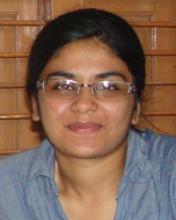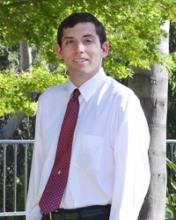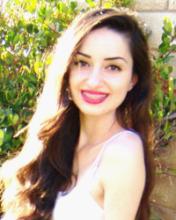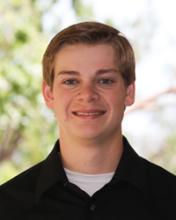February 24, 2015
Harmanpreet Panesar—a California State University, Northridge senior—isn’t only going to class and planning her life after graduation like many undergraduates. She’s also working on DNA research that could someday save a life.

Panesar is one of the eight recently announced 2013-2014 Presidential Scholarship recipients. Each year, a handful of CSUN undergraduate students are selected to receive this prestigious award, which includes a $5,000 scholarship, recognition at the fall convocation, a reception at the university president’s residence and, perhaps most importantly, the opportunity to conduct a year-long, faculty-mentored research project. Each year, the scholars present their work to the university president, administrators, faculty and fellow students at the annual Northridge Scholars Program Exhibit in May.
Panesar’s research will focus on identifying and synthesizing a compound that binds tightly to DNA.
“A good DNA binder may be used to repair damaged DNA sequences,” Panesar said. “One or more of these compounds may be used to treat life-threatening diseases such as cancer and other genetic disorders.”

Several of the other Presidential Scholar recipients will also conduct health-related research. Ram Wolman, a fourth-year molecular and cell biology major, will be studying promoter regions of bacterial genes to determine how bacteria become resistant to antibiotics.

Fellow molecular and cell biology major Tania Benyaminwill be synthesizing a catalyst for the metallic element ruthenium, which as applications in producing in several commercial materials, including pharmaceuticals.
Psychology major Alina Valdez will be exploring a different aspect of health: stress. She will be validating quicker methods for measuring stress to determine if they are as effective at predicting stress-related complications like anxiety and depression as traditional, longer tests for depression.
Computer science major Matthew Newbill will spend the year testing the design of a new digital microfluidic biochip, a device used to mix fluids to precise concentrations at a sub-millimeter scale.

The experience of conducting a research project from initial design to final presentation is invaluable for the students.
“I will be able to gain experience designing and running a study from beginning to end on my own,” said Valdez, “and will also gain the experience of writing up my results and, hopefully, sending them out for publication. This project gives me some preparation, experience and guidance on what I may expect in a Ph.D. program.”
“I am very excited to have the opportunity to present my data analysis to President Harrison, the faculty and the scholars,” said Panesar. “It has reinforced my desire to excel as a scientist-in-training and as a student.”
The Presidential Scholarships are funded by generous donations from the Associated Students, the Bayramian Family Scholarship Endowment, the Blenda Wilson Scholarship, the Diane Ryan Scholarship Endowment and the Medtronic Minimed Endowment.
For more: You can help other students by contributing to CSUN student scholarships.
